by Matthew Hardin
 On April 22, 2016, Governor McAuliffe issued a blanket order, in which he purported to restore the civil rights of convicted felons (rights to hold public office, the right to vote, right to sit on a jury, and right to serve as a notary). Under the Constitution of Virginia, criminals convicted of a felony offense automatically lose their cvil rights, but the Constitution allows the Governor to restore those rights so long as he provides the General Assembly the “particulars of every case of fine or penalty remitted, of reprieve or pardon granted, and of punishment commuted.”
On April 22, 2016, Governor McAuliffe issued a blanket order, in which he purported to restore the civil rights of convicted felons (rights to hold public office, the right to vote, right to sit on a jury, and right to serve as a notary). Under the Constitution of Virginia, criminals convicted of a felony offense automatically lose their cvil rights, but the Constitution allows the Governor to restore those rights so long as he provides the General Assembly the “particulars of every case of fine or penalty remitted, of reprieve or pardon granted, and of punishment commuted.”
For years, Virginia Governors restored civil rights on application from convicted felons who had rehabilitated themselves and established peaceful lives as productive members of the community. Governor McAuliffe, however, decided not to wait for applications from felons, applications in which the convicted person had the opportunity to explain the process of rehabilitation, prove that all conditions of the criminal sentence had been fulfilled, and to establish worthiness for the restoration of rights. Instead, Governor McAuliffe decided to restore the civil rights of felons through a blanket order – effectively restoring rights to 206,000 felons with one stroke of a pen. Luckily, the Virginia Supreme Court held in 2016 that the Governor could not issue such a blanket order under the Constitution of Virginia.
Unfortunately, the Governor, instead of returning to the old system and reviewing applications for clemency on an individual basis, decided to continue issuing restoration orders to all felons on a mass basis. Thousands of “individual” restoration orders are now issued each month. In the final months of 2016, after the Virginia Supreme Court threw out the “blanket” restoration order, McAuliffe issued approximately 66,000 individual orders restoring civil rights to felons, who can now vote, run for office, and sit on juries across the Commonwealth of Virginia.
Against this backdrop, a natural question arises: Who is the Governor restoring civil rights to? Are they rehabilitated and productive members of society, or hardened and dangerous criminals? A quick look at the Governor’s orders provides the answer:
- Nathan D Larson lost his civil rights in Virginia when he was convicted, in 2009, of threatening to kill the President of the United States. Mr. Larson had previous misdemeanor convictions, including a 2003 charge in Fairfax County for “use of computer for harassment” and two convictions for marijuana possession. Governor McAuliffe restored his civil rights in 2016, and Mr. Larson is now running for the House of Delegates. His political platform? According to the Washington Post, it “includes legalizing child pornography as well as incestuous marriage; allowing men to have multiple wives and physically discipline them; repealing the 19th Amendment; and abolishing state funding for girls and women to attend high school and college.” (https://www.washingtonpost.com/local/virginia-politics/he-threatened-to-kill-the-president-now-he-is-seeking-public-office/2017/03/08/ec31f768-0381-11e7-b9fa-ed727b644a0b_story.html?utm_term=.13f632c6a61f)
- Corey Russell had his civil rights restored by order dated October 4, 2016. It is still not entirely clear how Mr. Russell lost his civil rights in Virginia, or what crimes he was convicted of. What is clear, however, is what Mr. Russell is up to today. After a massive bust by police in New York City, Corey Russell and 23 other Virginians, were charged on March 8, 2017 with gun-smuggling offenses.
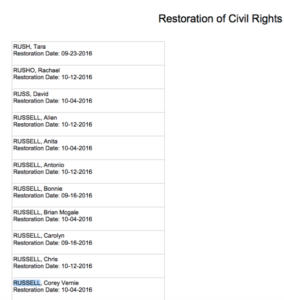
- On March 20, 2017, the Virginia Attorney General worked with law enforcement in Maryland and various local jurisdictions to break up a ring of heroin dealers. “Lives will be saved because they are no longer dealing in these addictive drugs,” Herring told the media through a press release. 11 defendants were charged with drug offenses and racketeering as a result of the bust. Of those 11 defendants, 3 had previously received rights restoration orders from the Governor: Robert E Hunt, Richard Williams Jr., and Tony Smith.
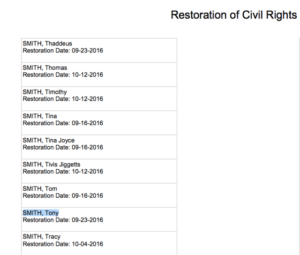
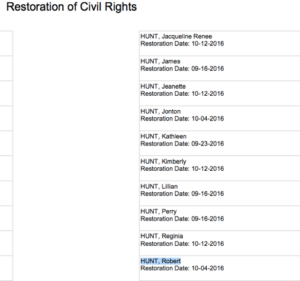
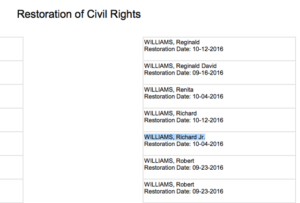
- The Governor didn’t stop at restoring civil rights to readily-identifiable individuals, however. He also went beyond the bounds of tradition to issue rights restoration orders for “Jane Doe” – an individual who may or may not even exist and is not readily identifiable from the order. Ms. Doe may not even be a legal name, but rather a legal pseudonym used in cases where the identity of a party is protected under the law. That the governor would restore civil rights to an individual who either cannot be identified, or is known only by a pseudonym instead of a legal name, raises further questions of whether the Governor exercised his Constitutional powers in a sober and discreet manner – or simply inked his signature to orders wholesale, without even the most rudimentary of investigation.
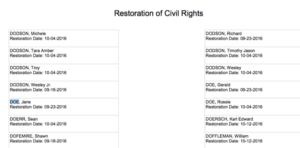
Everybody – even convicted felons – deserves a second chance after satisfying any debts to society and showing evidence of rehabilitation. The problem with what Governor McAuliffe has done, however, is that he has restored rights on a blanket basis without considering the facts of each individual case or the details of any individuals’ crime or rehabilitation. Indeed, court records show that the governor has restored rights to habitual criminals, some of whom have gone on to commit crimes such as gun smuggling and drug-dealing. Worse, he has failed to identify these criminals with sufficient specificity for the citizenry, or law enforcement, to identify those individuals whose rights have been restored.
Virginia deserves better.



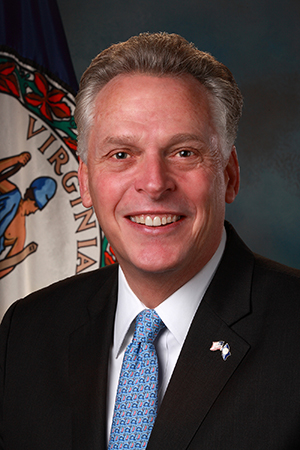



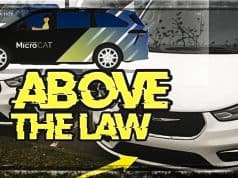

[…] Governor, Terry McAuliffe, is providing taxpayer-funded state resources to an organization that vows to unseat President […]
[…] Schilling – Virginia Governor, Terry McAuliffe, is providing taxpayer-funded state resources to an organization that vows to unseat President […]